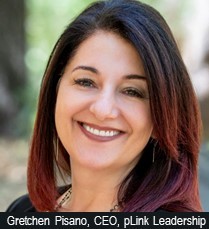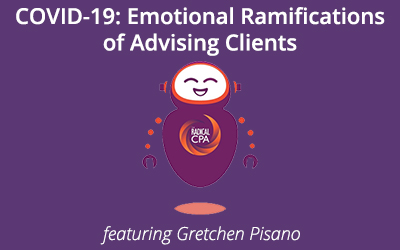Recently my social media followers got the opportunity to listen to Gretchen Pisano, CEO of pLink Leadership and leadership consultant. She told us to be humans first and CPAs second, and think about what leadership our clients need form us right now. I loved talking to Gretchen because she provides an amazing perspective as a leadership guru and an innate understanding of how people handle big changes and dramatic shifts in their lives.
One of my biggest takeaways from talking to Gretchen is that before we can move on, we have to first accept that we’re in an extraordinary position. And when we’re faced with big changes, the first thing we do is to look for a historical or personal map. Unfortunately, we do not have a map right now.

The result is a really scary, really uncomfortable situation. Gretchen explained that in times like this, people respond in one of two ways:
They either accept things as they are right now and begin to offload the risk as they wrap their heads around the new reality. They move towards opportunities. Best-case scenario.
OR, they delude themselves with fake stories about what they’re really dealing with, and as a result, they become paralyzed with fear. It’s an unproductive state of denial. People in this state make decisions based on cherry picked information that fits their delusions. Worst-case scenario.
Be honest with yourselves: are you facing reality right now or ramping up delusions with irrational information?
Trust me, there is no judgment here. We’re all struggling in some way. But if you’re in a state of denial and telling yourself stories that don’t match up with the reality of what’s happening, I want you to admit that so you can move on.
Leaders especially have to ground themselves in the reality of what is happening. What this looks like is an intentional commitment to “show up.†Do your best to understand the larger environmental issues. Identify what you can control and what you can’t. Then you must make a decision to mentally show up. Own what you can, let go of what you can’t, and be able to recognize the difference. As you go through this process, Gretchen reminded us to continue identifying rational thought versus fear-based thought. You want to avoid getting into a total state of fear where your ability to make decisions or act on information you have in front of you now is paralyzed. Here’s a tip: if you find yourself trying to explain things away, you’re probably spiraling. Take a step back.
That all sounds great, but as CPAs and accountants, you may be wondering at this point what this has to do with client relationships. Glad you asked! It basically starts with reassuring yourself that you DO know what you’re doing! (You do, I promise.) The best way to handle freaked out clients is to look at their financial statements and do what you do best. Ask them questions. Get into New Client Onboarding mode so you can uncover some key information about how things are going for them.
- Learn about their business
- Understand where the business is now
- Uncover their concerns
- Identify what’s keeping them up at night
- Determine how you can help them
- Find where you can add value
Ask big, open-ended questions and be prepared to listen. Some things never change. And in a time of drastic change, it feels good to go back to something familiar.
As a CPA, it’s your job to understand your client’s tolerance for risk. This hasn’t changed, either. Risk is informed by how much overhead they have, how old they are, the status of their retirement fund, and much, much more. Your clients will feel valued and heard if you can create a safe space for them in a judgment-free zone. You’re in a judgment-free zone here, by the way. I believe in you!
Now is not the time to be the smartest person in the room or the guy or gal with all the answers. Don’t say you can fix it, because you can’t. What you can do is allow clients the space to feel nervous and scared. You can – and should – show compassion and empathy. Be there with them and help them find their way through this. It’s much the same as before, but there’s less emphasis on being the expert and more on being an excellent financial coach and listener.
It can be really hard to do that when you’re also going through similar emotions. Gretchen talked about grounding yourself before you get on a call or video conference. Reinforce your self-confidence to advise and analyze based on financial and situational facts. If you’re freaked out, do what you need to do – scream into a pillow, meditate, exercise, whatever. But when you get on that call, know that your professional expertise is based on a long history of financial and tax know-how. Lean into your job as both a sympathetic ear and well-seasoned CPA and accountant.
The silver lining here is that you don’t have to worry about giving clients the best advice or the right answer. Right now, there IS no right answer. Your value is rooted in your knowledge of your field and your ability to ask great questions based on what you already know about them.
Another silver lining, maybe, is that when this is over, you’ll be able to add therapist to your business card. We’ve always sort of functioned in that role; we pay attention, we get to know our clients, we know their families and major life events … but now, what’s happening requires us to really pay attention and do our homework. We need to pay attention not just to our clients and their industries, but also the national and international news. Then we need to decide how that information – again, information grounded in facts, not delusions – applies to our clients.
Clients look to us as knowledgeable sources to help them interpret the news and make decisions for their business and employees. It’s a BIG job, to be sure. But you are the perfect person for that responsibility! You have years of professional experience, good judgment, knowledge of your clients, and the ability to put many pieces of a financial puzzle together. Now you also must add to that a great empathetic connection and help your clients channel their fears and nervous energies into plans for the future.
Don’t worry about having all the answers. Focus on your connection with your clients and guide them toward decisions they may already know are right. Listen to your gut and trust in yourself that you have the skill set to handle this, not just for yourself, but your clients, too.
In my next video interview, Gretchen and I will talk about taking care of you … stay tuned.
Learn more about what Gretchen has to say about leading your team and leadership at home by watching the entire video:

0 Comments